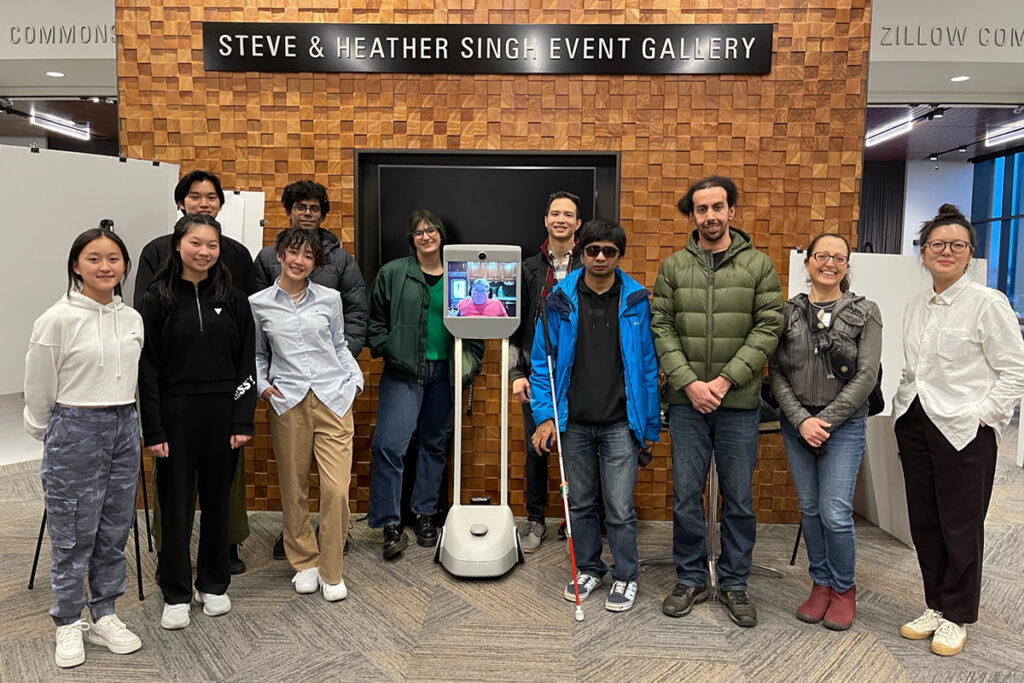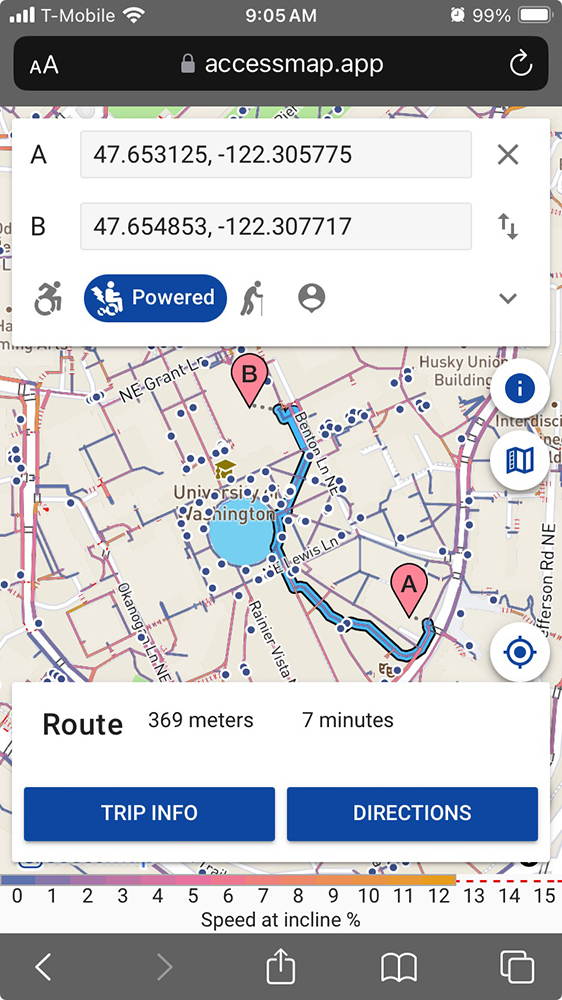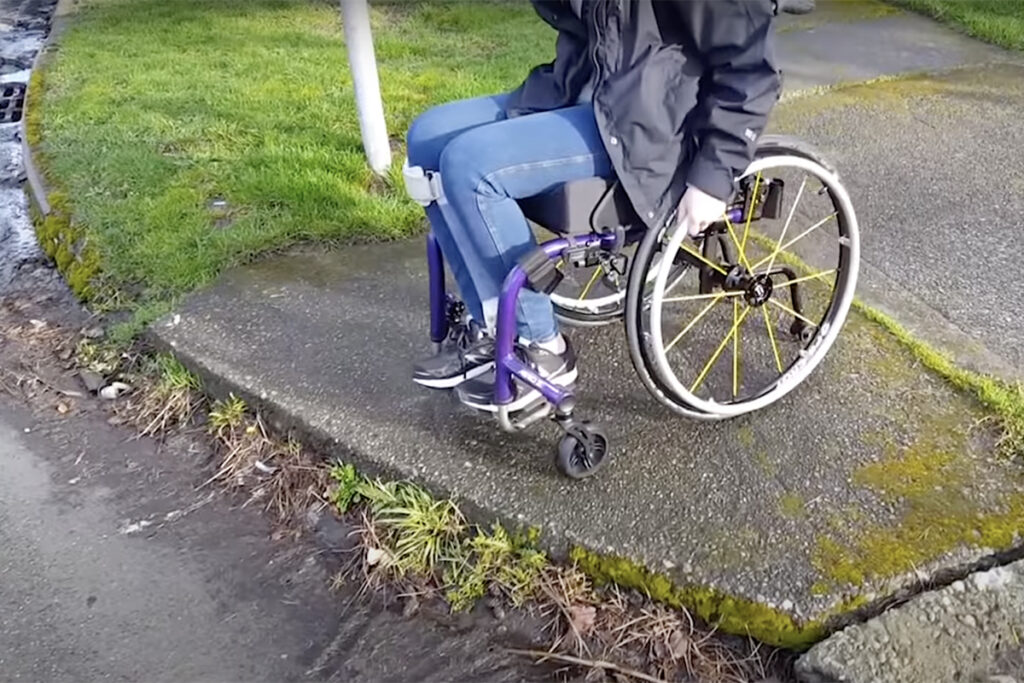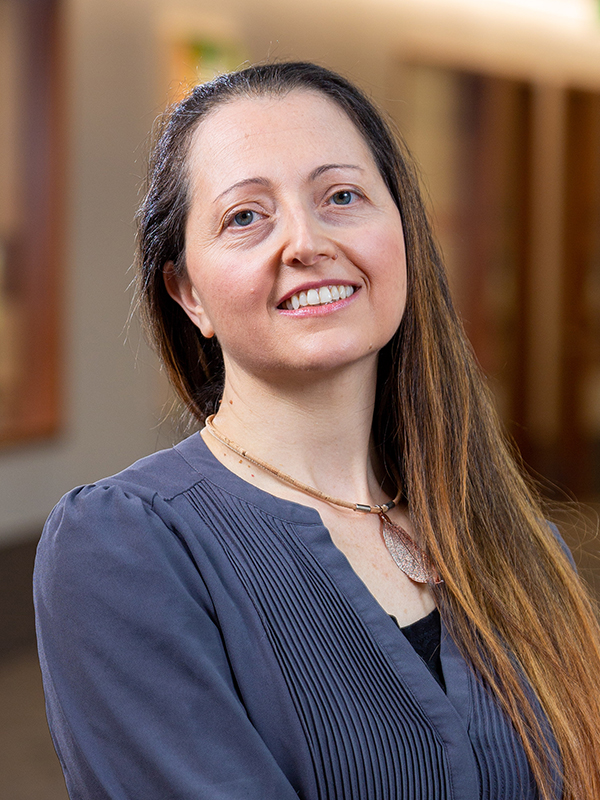In the spring of 2015, the City of Seattle organized a competition and invited teams to “Hack the Commute” by using technology to improve mobility for residents across the city. Among the participants at City Hall was a group of University of Washington students calling themselves Team Hackcessible who had developed a prototype of a web-based trip planning tool called AccessMap. The tool, as envisioned, would combine publicly-sourced and user-submitted data to enable individuals to customize their route around Seattle based on their mobility needs, accounting for factors such as the steepness of hills and the presence or absence of curb cuts.
Under the tutelage of Anat Caspi, director of the Allen School’s Taskar Center for Accessible Technology, Team Hackcessible took home first prize — and the Taskar Center embarked on a journey that would take it from the streets and sidewalks of Seattle, Washington to Santiago, Chile.
Not long after its triumph at the civic hackathon, the Taskar Center launched OpenSidewalks under the auspices of the UW eScience Institute’s Data Science for Social Good program. OpenSidewalks aims to make data about the public right of way consistent through a publicly available data schema and data collection tools that allow for manual editing in addition to machine learning and automated tools. It also provides educational resources to overcome some of the socio-technical hurdles and misconceptions that people have about access in the public right of way.
With OpenSidewalks up and running, Caspi worked with King County Metro to incorporate the data specification and tooling into the agency’s own paratransit service planning and tools — including data it collects for the provision of paratransit services to people with disabilities in Seattle and across the county.
“Actual deployment into a large organization revealed a number of important points,” said Caspi. “It became clear to us that people’s understanding of what constitutes ‘accessible’ can vary wildly across transportation planners, administrators and well-meaning crowdsourcing mappers.”
Following the integration of OpenSidewalks into King County Metro’s processes, in 2019 the Taskar Center conducted a study of capacity building. Meanwhile, back on campus, Caspi was pouring her energy into building capacity of a different sort: the capacity to create and use artificial intelligence and data science in a way that addresses, rather than amplifies, ableist bias. For example, in 2017 she launched a vertically integrated project course, Responsible Data Science in Urban Spaces, that offers UW students hands-on experience with developing data-driven software tools to create more accessible, inclusive communities by applying innovation to a range of issues spanning social, economic, health and mobility justice. To date, 241 undergraduate and 23 graduate students have completed the course.
Caspi also leads AI4ALL at UW, a free workshop for high school and first-year college students co-sponsored by the Institute for Foundations of Data Science. Each year, 40 students spend part of the summer learning about how data science, geographic information science and machine learning can be applied to daily life. For current practitioners, Caspi developed a “Non-Ableist AI” workshop and toolkit; since she began offering the workshop four years ago, more than 420 people have participated.
For these and other contributions spanning nearly a decade of leadership at the Taskar Center, Caspi received the 2023 Human Rights Educator Award from the City of Seattle’s Human Rights Commission.
It just goes to show that, when it comes to advancing accessibility, there’s no place like home.
“I have always thought making an impact on local communities is where it starts,” said Caspi. “The Seattle commission’s focus on disability rights as civil rights serve as a reminder of the importance of collaborative efforts in creating a more inclusive and just society.”
Those efforts range from the expansive — mapping the accessibility of miles of urban infrastructure — to those of a more human scale. For example, the Taskar Center partnered with not-for-profit Provail Therapy Center to create a library of adapted technology for people with different abilities to borrow for free. The 800 artifacts in the Pacific Northwest Adaptive Technology Library were either donated or created through community education events, where volunteers don protective goggles and get a crash-course in safe use of a soldering iron before adapting battery-operated toys to be switch-accessible for players of different abilities.
The power of play has been a recurring theme for the Taskar Center. The same year that AccessMap began attracting city leaders’ attention, the center introduced attendees at the Seattle Design Festival to the Universal Play Kiosk. Aligning with the event’s theme of “Design for Equity,” the Universal Play Kiosk demonstrated how to design an immersive environment to engage people of all abilities in collaborative play.

While they have a playful side, Caspi and her colleagues have shown they are serious about the Taskar Center’s motto, “designing for the fullness of human experience.” One of those colleagues — Olivia Quesada, the center’s manager of community engagement and partnerships — accepted the Seattle award on Caspi’s behalf during a ceremony to mark Human Rights Day last month. Quesada completed her UW honors thesis, “Disability Justice for Urban Planners and Designers,” working with Caspi; in her remarks, she shared what makes the center so effective.
“As an interdisciplinary team, we have built a space for recognizing and addressing systemic ableism in various technical and socio-technical systems,” she said. “Our practice of developing, deploying and translating artifacts, both in terms of technology and educational toolkits, is aimed at empowering individuals and communities to confront challenges related to disability justice with a growth mindset.”
The center’s own reach keeps on growing — not only in Seattle, but across the nation and around the globe. In 2021, Caspi launched the Transportation Data Equity Initiative with Co-PI’s Mark Hallenbeck, then director of the Washington State Transportation Center (TRAC), and iSchool professor Bill Howe, adjunct faculty member in the Allen School and founding co-director of Responsibility in AI Systems & Experiences (RAISE). That initiative builds on the Taskar Center’s previous work to address inequities in transit data and information at scale with support from the U.S. Department of Transportation.

Around the same time, the Taskar Center teamed up with the United Nations advocacy initiative G3ict — short for Global Initiative for Inclusive Information and Communication Technologies — on AI for Inclusive Urban Sidewalks. The project combines artificial intelligence with on-the-ground community partnerships to improve pedestrian accessibility in cities around the globe, with support from Microsoft’s AI for Accessibility grant and the Open Data Campaign. In 2022, the Taskar Center and G3ict earned the SmartCity Expo World Congress Living & Inclusion Award, one of a set of honors recognizing pioneering initiatives and ideas to make cities around the world more livable, sustainable and economically viable.
Which brings us back to where it all began. In the years following Hack the Commute, members of the original AccessMap team — including Allen School postdocs Nick Bolton, Ricky Zhang, and Sachin Mehta, all graduates of the UW Department of Electrical & Computer Engineering — and a succession of new student researchers drove the project forward. In 2017, Caspi and the team introduced their AccessMap web-based tool for the public that, upon first release, offered personalized trip planning for the Washington cities of Seattle, Mt. Vernon and Bellingham. Fast forward almost seven years later, and the center released a new, expanded version called AccessMap Multimodal. The latest iteration incorporates indoor transit information, where available, along with sidewalk data and extends to 11 cities worldwide — including several participants in the aforementioned AI for Inclusive Urban Sidewalks project. After racking up 65,000 user routing requests, AccessMap and its user base continues to grow.
Whether in Santiago or Seattle, Caspi’s tireless efforts at advocacy and education have put the Taskar Center itself on the map. But she’s eager to share the plaudits with her collaborators.
“This recognition is not just a testament to my efforts but a celebration of the collective dedication to promoting disability human rights and inclusivity by the Taskar Center,” Caspi said.
For more inspiration, join the Taskar Center today (Thursday, January 25) for the Ben Taskar Annual Memorial Events (12:00–3:00 pm) — including an overview of AccessMap Multimodal — and the Ben Taskar Memorial Distinguished Lecture (3:30–5:00 pm) featuring Drago Anguelov, vice president and head of research at Waymo.



